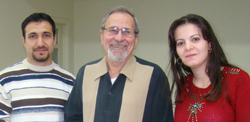Although the origins of the Middle Eastern church date back to antiquity, the newness of life offered through Jesus Christ continues to be experienced by believers in the region, according to a Presbyterian Church (U.S.A.) mission worker.
Their faith enables them to endure wars, economic hardship and persecution, says Nuhad Tomeh, the PC(USA)’s regional liaison to Syria, Lebanon and the Gulf.
“The Christians in the Middle East are still there because they believe in the power of the Resurrection and, in spite of what’s happening, we believe that after the ‘Sad Friday’ as we call it in Arabic, is the Resurrection Sunday.”
Tomeh, a native of Syria, nurtures relationships between the PC(USA) and its partner churches and organizations. He also supports the work of mission personnel and other Presbyterians interested in the region.
His fluency in Arabic and deep knowledge of the Middle Eastern culture help him build bridges between Presbyterians in the United States and Christians in the Middle East.
“I was brought up in the mission field,” Tomeh says. “I was not drawn to the mission field. I was living in it.”
One way he develops relationships between Presbyterians and Middle Eastern Christians is through his work with PC(USA)-related mission networks. The two networks in Tomeh’s region, Syria/Lebanon and Iraq each draw together pastors and laypeople from across the United States to focus on common interests and concerns.
Christians in the Middle East, he says, sense solidarity with Christians in the United States, and that is highly important to them.
“Christians in the Middle East need to be assured of that solidarity by the actions the PC(USA) and other churches are taking when it comes to supporting them by addressing issues with Congress and with other officials in this country,” he explains.
The relationships, however, go beyond political and social concerns, Tomeh points out. He emphasizes that a connection born of faith is embedded into the relationships between Presbyterians in the United States and Christians in the Middle East.
“When we talk about strengthening the presence of and witness of Christians in the Middle East we are talking about the strengthening of faith.”
In addition to being the PC(USA)'s regional liaison, Tomeh is associate general secretary for the Middle East Council of Churches. The Council has partnered with the PC(USA) and other churches to help internally displaced people in Iraq and refugees — both Christian and Muslim — who have fled to nearby countries.
Nearly 2 million Iraqi refugees are now living in Syria, Jordon, Lebanon and Egypt. “The Council works hand in hand with the local churches to support the refugees any way we can, providing assistance and job training especially for the young people,” he says.
The war in Iraq has taken a toll on the country’s five Presbyterian congregations. Tomeh notes that churches suffered immensely in 2004 when extremist elements began persecuting Christians. Some Presbyterian pastors were beaten and an elder was killed.
Tomeh is heartened by the faithfulness of Christians in Iraq and other Middle Eastern countries. The gospel’s hope “is what’s keeping many Christians going in the Middle East ,” he says.
“I believe that’s what gives me the strength to continue this ministry, which sometimes can be very depressing and frustrating.”
Such hope, he recalls, was demonstrated by one of the pastors who was forced out of Iraq. He came to Lebanon and told church leaders he wanted to help his people.
“So he started a ministry with Iraqi refugees with the support of the Presbyterian Church in Syria/Lebanon and with some help from the PC(USA),” Tomeh says. “You know, this person was almost killed and the one thing that maybe you'd think he should do is hide because the radicals who pushed him out could follow him out of the country. But he was looking for a way to minister to his people.”
In December Tomeh helped organize an ecumenical seminar for 18 young Iraqi Christian leaders. After the event, Tomeh wrote supporters in the United States: “God will never leave his church in Iraq, and these young people are a living example of his presence in Iraq.”
Tomeh is equally convinced that God will never abandon the church in other places in the Middle East. Nevertheless, the dwindling number of Christians in the region concerns him and others. Joblessness, wars, political instability and/or persecution have sent millions to Europe, North America and other places during the past 100 years.
The region has gone from being 20 percent Christian a century ago to 5 percent today, according to some estimates.
Yet the Christian influence, which began in New Testament times, is woven deeply into the history of the Middle East, Tomeh says. “The Christians in the Middle East are not converts from Islam as many people think.” Christianity, he explains, was well established in the region before the founding of Islam.
Historically, Christians have made valuable contributions to the Middle East and continue to do so, Tomeh says. “They strengthen their own people as Arab Christians, but they also reach out to others and work for the development of their countries in education, health care, and the concept of democracy and political life.”
The PC(USA) and other denominations, Tomeh says, can play an important role in strengthening the church in the Middle East. “I think not only moral support is very important, political support is also very important, and also financial support.”

